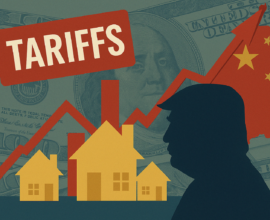How to Protect Yourself: Land Sales Scams on the Rise!
Land fraud, also known as home title theft or deed theft, is a troubling trend on the rise. This real estate scam involves stealing someone’s identity and property by forging deeds to illegally transfer ownership. According to the FBI, reported losses from real estate fraud increased by over 64% from 2020 to 2021. Their investigation found that 11,578 people nationwide reported losses of at least $350,328,166 due to various real-estate scams.
As a real estate investor, it’s crucial to understand how scammers are targeting properties and what precautions you can take. Arm yourself with the knowledge to keep your investments safe.
The Anatomy of Land Fraud: How Criminals Operate
Land fraud typically targets vacant, undeveloped plots of land. Scammers first identify a property that appears abandoned. These are properties without mortgage payments, and outdated contact info for the owner, etc. With a vacant parcel that shows no signs of activity, criminals can more easily conduct a fraudulent sale undetected.
Armed with the property’s information, scammers impersonate the landowner using forged ID documents and fake notary stamps. They create phony deeds purporting to sell the land, often for well below market value, to entice unsuspecting buyers. By the time the true owner discovers the scam, their property has already changed hands multiple times.
Here are just some of the tools in the land fraudster’s toolbox:
Forged Documents
Using the real owner’s name, scammers create forged property deeds, contracts, loan documents, and title paperwork. Official-looking notary stamps and signatures are added to fake documents to appear valid. Fraudsters have become experts at mimicking official forms that are nearly impossible to catch when being processed.
Impersonation
Scammers steal a property owner’s personal information: name, date of birth, and Social Security number, etc. They use this info to impersonate the owner, list the property for sale, and communicate directly with potential buyers.
Fake Advertisements
An increasingly common tactic is posting ads online for incredible real estate deals well below market value. When interested buyers inquire, scammers pose as the property owners. Without viewing the land, buyers transfer “deposits” that the scammers pocket.
Quitclaim Deeds
Quit claim deeds transfer property ownership without any warranty of valid title. Scammers persuade the property owner to sign a quitclaim deed by posing as a developer, real estate agent, or other official. The owner signs away rights, believing they are participating in a legitimate sale and not realizing they are setting themselves up for a huge disappointment.
Scammers are creative in finding ways to separate property owners from their land. Real estate investors make prime targets since vacant land parcels are not as actively monitored as properties with tenants or under development.
Real-Life Examples of Land Theft
To understand how easily even savvy investors can be duped, let’s examine two disturbing cases:
Palm Beach County, Florida: Robert A. Tribble Jr. was accused of filing fake deeds with the Clerk of the Circuit Court & Comptroller’s offices. These documents made it appear that Tribble owned homes that he did not. Tribble targeted homes that were abandoned or that were in foreclosure. He would then advertise the homes for sale or rent, tricking people into giving him money. In one example, Tribble was reportedly given $23,500 as a down payment. Tribble is accused of defrauding people of over $240,000. Tribble was eventually convicted of running an organized fraud scheme and identity theft. In 2015, he was sentenced to ten years in prison and $134,000 in restitution to his victims.
Fairfield, Connecticut: Dr. Daniel Kenigsberg discovered a $1.5 million, 4,000-square-foot house being built on his owned vacant land. Both Kenigsberg and the property developer claimed to be victims of land fraud when land ownership was transferred to Sky Top Partners, LLC. The property being built is listed for sale for $1,475,000. While litigation is currently underway, the lawsuit demands that work on the new house must be stopped.
Protect Your Assets: Prevention Tips for Investors
While scammers are deft at stealing land by exploiting the property transfer process, investors can take precautions to guard vacant properties and land parcels:
- Monitor property records routinely: Enroll in a title monitoring service to receive alerts about any activity associated with deeds, titles, or ownership of your properties.
- Review documents thoroughly: Carefully examine all paperwork related to your land transactions. Look for any errors, omissions, or alterations that could indicate fraud.
- Beware of “too good to be true” offers: An unsolicited offer well below market value from an unknown person should raise suspicions. Verify the potential buyer’s identity thoroughly first.
- Know changes that require your authorization: Certain actions, like deed transfers, property sales, and adding lienholders, require your participation. Contact authorities if you notice suspicious changes made without your consent.
- Limit public details about vacant land: Don’t advertise specific location details, parcel numbers, or other info about undeveloped plots online, which can attract scammers looking for vacant targets.
- Add property managers for faraway land: If you own out-of-state or remote parcels, engage a property management company to monitor the land in your absence.
- Review title insurance policies: Make sure title insurance coverage for vacant land parcels is up to date in case ownership disputes occur.
- Take care with purchases: Always get a title search when you purchase a property, especially ones from foreclosure.
- Create owner’s alerts: Set up notifications with local registers, recorders, and tax assessors to receive alerts about legal changes involving your properties.
- File preemptive legal documents: You can file a quiet title action or restrictive covenant to proactively prevent fraudulent transfer of deeds.
While land fraud is on the rise, ideal targets are vacant parcels with absentee owners. By taking preventative measures to monitor your properties closely, scammers will have a much tougher time stealing ownership undetected. Diligence is key.
What To Do If You’re a Victim
If you discover your vacant land has fallen prey to fraudulent transfer or sale, immediate legal action is critical to reclaim ownership rights. Here are the important first steps:
- Alert police and report the fraud: File reports with local law enforcement and the FBI’s Internet Crime Complaint Center detailing how the theft occurred.
- Notify contacts associated with the property: Advise the tax assessor, recorder of deeds, title insurer, and tenants, etc., that the land transaction was fraudulent.
- Get a written legal opinion: Consult a real estate attorney to get a letter stating you are the sole legal owner of the property.
- Record affidavits: To dispute any forged deeds, file affidavits with county records affirming you are the true owner and did not consent to any sale or transfer.
- Send cease and desist notices: Demand the scammers immediately stop any sale, development, or monetization of your stolen land.
- File a civil lawsuit: You may need to take alleged fraudsters to court to officially reclaim your property rights. A real estate attorney can help navigate the litigation process.
- Mitigate losses: Work to recoup assets stripped from your land and unwind fraudulent sales to innocent buyers to minimize financial harm.
By responding quickly, you can limit damages from land theft and prevent ownership claims from new deed holders. But prevention is truly the best cure, staying vigilant against scammers targeting your vacant real estate assets.
The Risks for Real Estate Investors
While all property owners are potentially vulnerable to land fraud, real estate investors face heightened risks. Investors often own multiple vacant parcels across different geographic areas. With less oversight than primary residences or developed land, these vacant holdings can more easily fall prey to scammers. In 2019, more than 3.2 million scam reports were made to the FTC, resulting in $1.9 billion in losses. Most of these scams involved mortgage fraud, investment fraud, home repair fraud, and rental listing fraud.
Absentee owners may go long stretches without checking on remote properties, allowing time for fraudulent sales to progress. And publicly listed ownership records connect criminals directly to vacant plots tied to investors. Real estate investors and property owners must be vigilant and proactive to protect their investments.
Investors can reduce the chances of land theft by taking preventative measures like title monitoring, recording alerts, and property management. Of course, extra vigilance is required to watch over a larger portfolio of undeveloped land assets. Don’t let vacant properties become easy targets. With proper precautions, real estate investors can guard against this invasive fraud.
William (Will) Haynes has been a professional content creator, writer, and educator for over a decade. Before diving into full-time freelance work, Will spent his days leading writing groups and teaching English overseas. He’s been fortunate enough to win a few non-fiction writing contests and has had several original plays produced across the Midwest. Currently, Will is either behind his camera, strumming his guitar, or pounding away on the keyboard. He is currently publishing over 50,000 words each month about business, marketing, the auto industry, real estate investing and more for business websites, blogs, and online publications.








